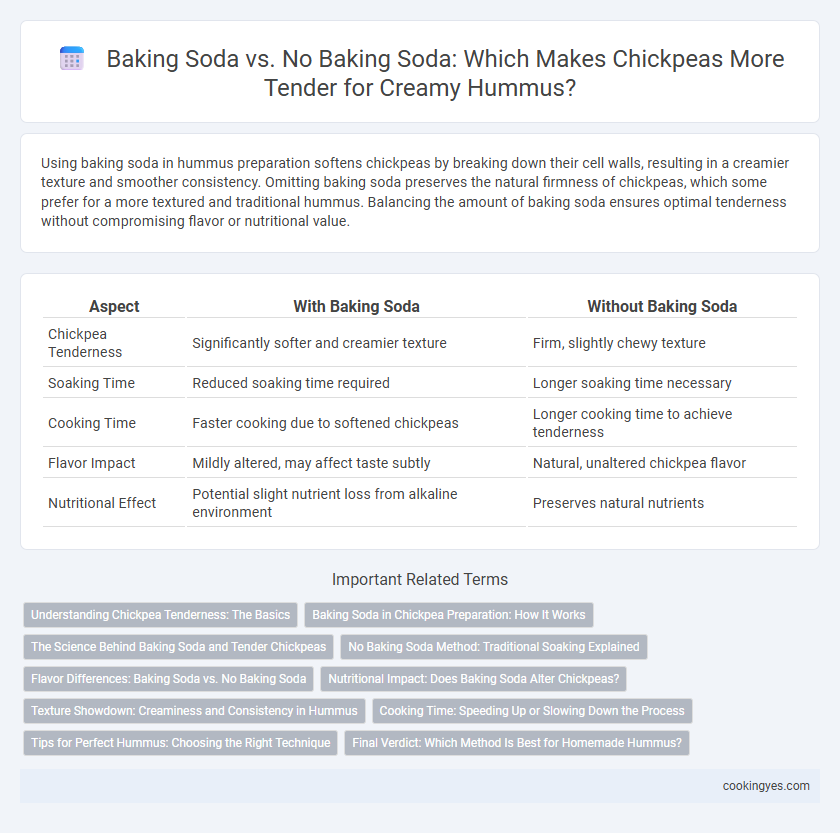Using baking soda in hummus preparation softens chickpeas by breaking down their cell walls, resulting in a creamier texture and smoother consistency. Omitting baking soda preserves the natural firmness of chickpeas, which some prefer for a more textured and traditional hummus. Balancing the amount of baking soda ensures optimal tenderness without compromising flavor or nutritional value.
Table of Comparison
| Aspect | With Baking Soda | Without Baking Soda |
|---|---|---|
| Chickpea Tenderness | Significantly softer and creamier texture | Firm, slightly chewy texture |
| Soaking Time | Reduced soaking time required | Longer soaking time necessary |
| Cooking Time | Faster cooking due to softened chickpeas | Longer cooking time to achieve tenderness |
| Flavor Impact | Mildly altered, may affect taste subtly | Natural, unaltered chickpea flavor |
| Nutritional Effect | Potential slight nutrient loss from alkaline environment | Preserves natural nutrients |
Understanding Chickpea Tenderness: The Basics
Chickpea tenderness is primarily influenced by cooking methods and water pH, with baking soda acting as an alkaline agent that softens the chickpea's cell walls faster. Using baking soda reduces cooking time significantly by breaking down pectin and cellulose, resulting in a creamier hummus texture. However, excessive baking soda can alter flavor and nutritional content, making precise measurement crucial for optimal tenderness without compromising taste.
Baking Soda in Chickpea Preparation: How It Works
Baking soda in chickpea preparation increases pH levels, softening the chickpeas by breaking down their cellulose and hemicellulose structure, resulting in faster cooking and enhanced tenderness. This alkaline environment facilitates water absorption, allowing the chickpeas to swell and become creamy without extended soaking. Using baking soda strategically improves hummus texture, creating a smoother, creamier dip that maintains chickpea integrity.
The Science Behind Baking Soda and Tender Chickpeas
Baking soda increases the pH level of the soaking water, breaking down the chickpeas' cell walls and softening the skins for a tender texture. The alkaline environment accelerates the breakdown of pectin and cellulose, essential components in plant cell walls, resulting in faster cooking times and creamier hummus. Without baking soda, chickpeas retain their firmer structure, leading to a chewier bite and longer cooking duration.
No Baking Soda Method: Traditional Soaking Explained
Soaking chickpeas in water for 8 to 12 hours without baking soda allows them to absorb moisture gradually, preserving their natural texture and flavor essential for authentic hummus. This traditional method softens the legumes effectively by activating enzymes and breaking down some starches, resulting in tender chickpeas without compromising nutritional integrity. Avoiding baking soda prevents an alkaline taste and maintains the chickpeas' natural color, supporting a more genuine and wholesome hummus experience.
Flavor Differences: Baking Soda vs. No Baking Soda
Using baking soda when cooking chickpeas creates a softer texture by breaking down the beans' cell walls but can impart a slightly soapy or metallic flavor, which may alter the traditional hummus taste. Chickpeas cooked without baking soda retain their natural, nutty flavor and firmer texture, resulting in a more authentic and robust hummus flavor profile. Flavor preference often depends on whether one values texture softness over the pure, earthy taste of chickpeas.
Nutritional Impact: Does Baking Soda Alter Chickpeas?
Using baking soda during chickpea cooking raises pH levels, breaking down cell walls and softening texture more quickly while potentially reducing cooking time and energy use. This alkaline environment can lead to slight nutrient loss, particularly of water-soluble vitamins like B-complex and some minerals, due to enhanced leaching into the cooking water. However, the overall macronutrient profile, including protein and fiber content, remains largely unaffected by baking soda treatment.
Texture Showdown: Creaminess and Consistency in Hummus
Baking soda plays a crucial role in breaking down chickpea skins, resulting in a creamier and smoother hummus texture by softening the chickpeas more effectively during cooking. Without baking soda, hummus tends to have a grainier consistency due to firmer chickpea skins that resist complete softening. The choice to use baking soda directly impacts the mouthfeel, with softened chickpeas enabling a richer, more velvety dip.
Cooking Time: Speeding Up or Slowing Down the Process
Using baking soda in cooking chickpeas significantly reduces cooking time by softening their outer layer, allowing water to penetrate faster and resulting in tender hummus more quickly. Without baking soda, chickpeas require longer soaking and extended boiling, which slows down the preparation process but preserves their natural flavor and texture. Adjusting cooking time based on the use or omission of baking soda is crucial for achieving desired chickpea tenderness in hummus recipes.
Tips for Perfect Hummus: Choosing the Right Technique
Using baking soda during chickpea cooking significantly softens the beans by raising the pH level, which breaks down the cell walls faster and results in creamier hummus texture. Without baking soda, soaking chickpeas overnight combined with longer boiling times ensures tenderness but requires more patience. For perfect hummus, balance between soaking duration and baking soda usage is key to achieving smoothness without compromising flavor or nutritional value.
Final Verdict: Which Method Is Best for Homemade Hummus?
Using baking soda during chickpea cooking significantly softens the beans by breaking down their cellulose structure, resulting in creamier hummus texture. Without baking soda, chickpeas retain more of their natural firmness, which can yield a slightly grainier hummus but preserves more of the legume's natural flavor. For homemade hummus, incorporating baking soda is the preferred method to achieve optimal tenderness and smooth consistency.
Baking Soda vs No Baking Soda for Chickpea Tenderness Infographic

 cookingyes.com
cookingyes.com